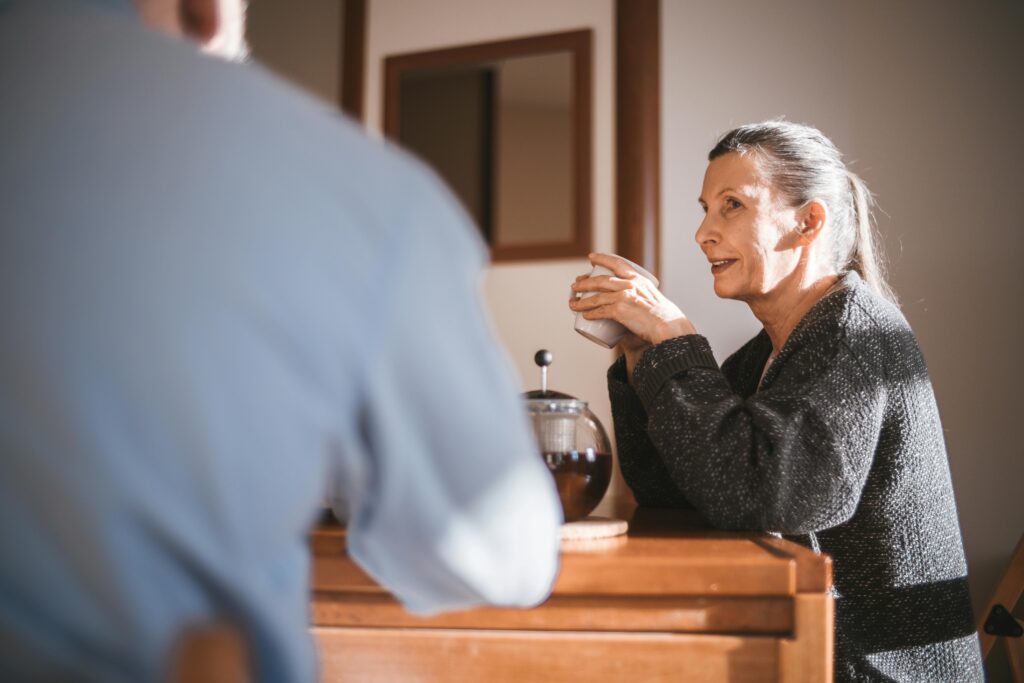
On Sunday, we explored different places in our lives that guiding principles might emerge. For instance, we said that some of our guiding principles might directly address a lie we’ve believed about ourselves. Our guiding principles still flow directly from our values and our vision for our lives and the world around us. But when we notice a place where we habitually experience feeling stuck or finding it difficult to show up with integrity, there’s probably a guiding principle that we could define more clearly.
Some guiding principles might speak to specific relationships. In fact, a closely related question was raised earlier this month at the discussion after The God I Know, presented in our Fellowship Hall by Getting to We. When it comes to people we know—especially people in our families— who seem to hold radically different beliefs from us, we often find it difficult to be meaningfully connected and have important conversations.
Our emotions may prompt us toward conflict by fighting back, challenging, or persuading people to believe as we do. In my experience, this leads to things escalating rather than reaching any sort of meaningful “Aha Moment.” On the other hand, our emotions might prompt us to withdraw (what we’ve named as a distancing response). We might physically withdraw by leaving the room or just emotionally withdraw by keeping our mouths shut about our own beliefs and values. This doesn’t lead to deeper connection either, but it keeps us feeling safe.
Safe from what, though? Our biochemistry doesn’t differentiate between saber-toothed tigers and someone raising their voice. Threats just register as threats, and the same physical reactions get kicked off whenever it seems like there’s cause for alarm. We have to give ourselves space to reflect on what’s really being threatened. Most of the time, we’re safe enough to have challenging conversations, especially when we have a relationship with people. Our bodies just don’t always know that we’re safe. Clear guiding principles can keep us from reacting out of fear or anxiety when we most need to be centered and grounded in our relationships.
This shows up in my own relationships with family. Most of my family have more conservative beliefs than I do, both spiritually and socially. They do not hold queerness, gender fluidity, or pansexuality as acceptable. They do not affirm earth centered spirituality as legitimate. They do not share a vision of the world where all people are treated as sacred and worthy of love and belonging. For the most part, my family are very clear and direct about these opinions.
At the same time, they often want me to be present for holidays and special occasions. I have a choice about whether I choose to be present, and I also have a choice about how I will show up. I could set aside my typical wardrobe and dress inconspicuously. Or I could dress in a way that is intentionally provocative. Or I could just wear what I feel like wearing and not concern myself with their opinions about my clothing.
I could keep quiet when they pray for God to punish the wicked and “restore our nation to righteousness,” knowing that I fit into their category of what makes a person wicked. Or I could challenge their theologies in any number of ways. Or I can offer my own heartfelt prayer to supplement their sentiments.
When they opine about wokeness and engage in marginalizing and otherizing people, I can assume the mantle of minister and strive to connect them to more life-affirming values. I can walk away and choose not to be subjected to their perspectives. Or I can match their candor and confidence with my own opinions without demanding agreement. And I don’t have to decide ahead of time how I must be.
So, my guiding principle around family is: I am curious, calm, compassionate, clear, creative, and courageous. I connect with my own Inner Wisdom and with the people around me. Again, not perfectly! But defining this north star guides me back when I feel anxious and slip off the path, and it helps me circle back and repair things when I need to. These guiding principles allow me to feel what I feel in the moment, honor my own window of tolerance as it shifts and changes, and offer my best to myself and others.
You might frame things differently. You might say something as simple as “I value relationship over being right.” Or “I calmly share my perspective and listen to others with compassion.” What guiding principles can help you show up in a way that is intentional and connecting? What guiding principles help remind you that you are safe enough to have challenging conversations?
Share this post: